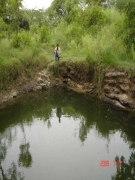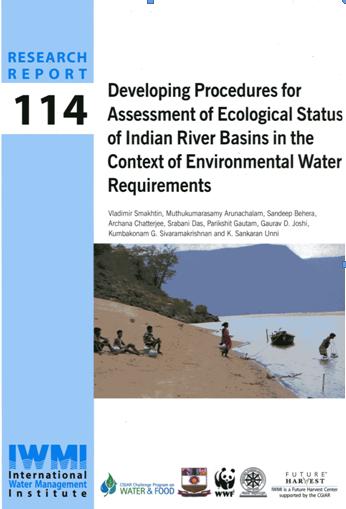/regions/political
Political
Water quality status of historical Gundolav lake - Kishangarh - South Asian Journal of Tourism and Heritage
Posted on 25 Aug, 2010 09:44 AMThis paper published in the South Asian Journal of Tourism and Heritage describes the water quality status of Gundolav Lake in Rajasthan, which was once used for drinking water as well as for recreational activities under the tutelage of the princely state of Kishangarh. This has now become a site of wastewater disposal and facing a critical threat for its sustenance.
Recent years have led to an increasing awareness of the importance of water bodies and the need for conservation of water bodies, especially freshwater wetlands. The Ramsar Convention (2002) identifies wetlands as the starting point for integrated water management strategies. This is because they are the source of fresh water, maintain the health of the water course and water bodies, have the capacity to supply water to meet the human needs and are a key to future water security.
Seven Steps to Hygiene - An educational booklet by Utthan
Posted on 25 Aug, 2010 09:22 AMThis document is an educational booklet on sanitation and hygiene published by Utthan, which works towards empowering women's groups to seek clean and adequate quality of water for all.
The booklet includes the details of seven steps that can be undertaken to attain sanitation and hygiene. The details have been explained in a manner that is simple and understandable and includes illustrations that are self explanatory and easy to follow.
The seven steps include:
- Use and protection of water sources
- Managing drinking water
Pani Panchayat: A model of groundwater management – A presentation by ACWADAM
Posted on 25 Aug, 2010 08:20 AM The presentation by ACWADAM deals with Pani Panchayats as a model of groundwater management.
The presentation by ACWADAM deals with Pani Panchayats as a model of groundwater management.
Pani Panchayat is the name first given to a movement by Mr. Vilasrao Salunke for motivating farmers of Naigaon village of the drought-prone Purandhar taluka of Maharashtra in 1974. The government's inability to deal with the drought situation prompted him to take a 40 acre land on lease from the village temple trust and develop a recharge pond in the recharge area of the village, a dug well in the discharge zone and a lift irrigation system.
Farmers got impressed with the results demanding a scale up of the experiment leading to the setting up of Gram Gaurav Pratisthan (GGP) through which the work was expanded to encompass both groundwater and surface water management.
The Global Innovation Commons- A Possible Resource
Posted on 25 Aug, 2010 12:36 AMA patent is a contract between an inventor and the public. In order to promote and reward innovation, the contract states that if an idea is (i) novel, (ii) non-obvious, and (iii) reduced to practice, the inventor or innovator, upon registration and full public disclosure of the innovation is thus provided a time limited monopoly to use the idea in commerce for one 20 year term. Under worldw
Measurement of weather parameters: Data collection and analysis – A presentation by ACWADAM
Posted on 24 Aug, 2010 09:29 PMThe presentation by ACWADAM deals with measurement of weather parameters and outlines the methods used in weather related data collection and analysis. Weather information is necessary for the planning and implementation of watershed programmes, especially in understanding factors like groundwater recharge, the relationship between recharge & discharge and in aspects like irrigation planning.
Augmenting groundwater resources by artificial recharge: A case study of Kolwan valley by ACWADAM
Posted on 24 Aug, 2010 04:19 PMThe presentation by ACWADAM deals with a case study of augmenting groundwater resources by artificial recharge in Kolwan valley, Mulshi taluka, Pune. The DfID funded project was undertaken by the British Geological Survey in collaboration with its partners in India from 2002–2005. The objectives of the study were:
- Improved knowledge of the impacts of managed aquifer recharge in different physical and socio-economic settings.
- Guidance on scope and effectiveness of managed aquifer recharge for implementers, funders and policy makers.
- Dissemination of knowledge.
Odisha Drought Update- Aug 13-20, 2010
Posted on 24 Aug, 2010 03:00 PM![]()
News from Odia and English (Bhubaneswar internet editions) news papers are put together at one place to provide an appreciation of Drought in Orissa periodically.
This Drought Update is being circulated among media, decision makers – legislatures, bureaucrats etc. with an aim to catalyze informed and expeditious decisions and actions.
Unprecedented floods in Ghaggar Basin in Punjab and Haryana : SANDRP, newsletter, June-Jul 2010
Posted on 24 Aug, 2010 11:18 AM
The SANDRP newsletter for June-July 2010 continues its critical analysis of dams, irrigation and related issues:
- Unprecedented floods in Ghaggar Basin in Punjab and Haryana
- Free-flowing rivers around the World
- Artificial Glaciers to Survive Global Warming
- Babli row between AP & Maharashtra
- Successful campaign against Rupsiyabagar Khasiyabada HEP
Environmental flows A methodology of calculation for India (Part 1)
Posted on 24 Aug, 2010 10:07 AM
In order to maintain the ecological goods and services of rivers and other hydrological regimes like wetlands, lakes, etc., environmental flow allocations (eflows) are a necessity. At the same time, water demands in India are increasing and will keep increasing and solutions like waste water treatment, pollution control, correction of leakages and wastage of water, efficient irrigation systems, efficient agricultural systems, etc., will take considerable time to evolve, even with our best efforts. So what should we do in the meantime? There are vulnerable ecological systems on the verge of collapse..How do we respond to these challenges?

